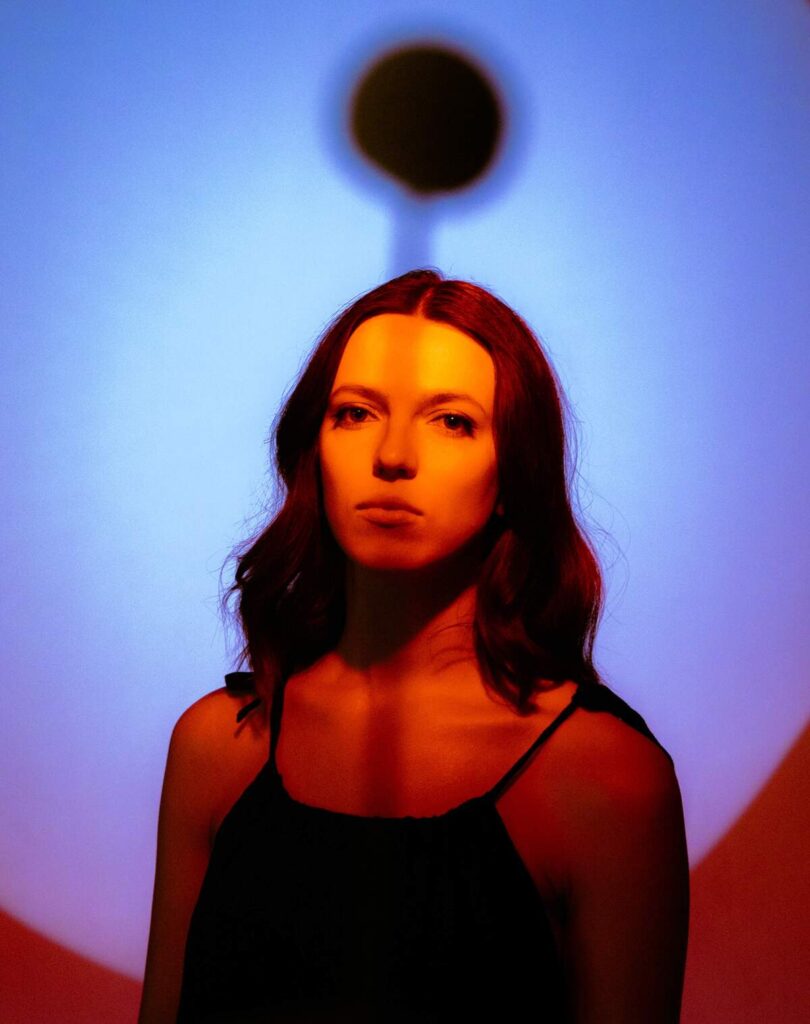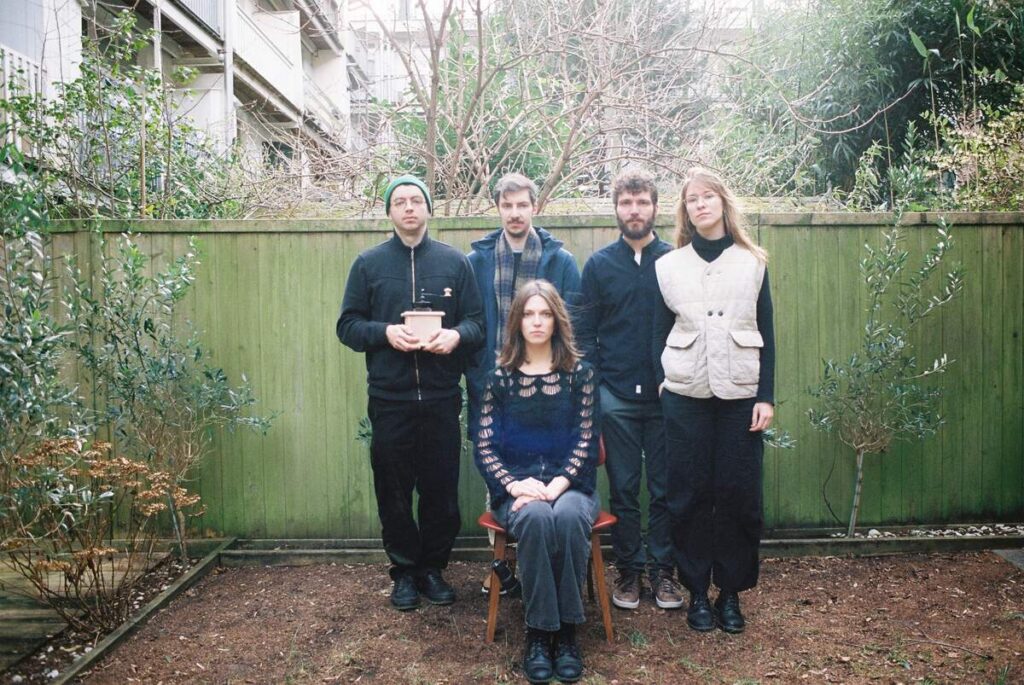Līva Dumpe | Interview | New Album, Tālskatis’
Latvian vocalist Līva Dumpe is a storyteller whose voice defies boundaries, weaving a tapestry of free improvisation and avant-garde exploration.
With her debut album, ‘Tālskatis,’ Dumpe opens up a personal journey—a deep dive into the spaces between her roots in Latvia and the transformation she’s gone through in the Netherlands. The album pulses with the tension of nostalgia, the yearning for self-discovery, and a fierce defiance to speak her truth. Rich harmonies, sharp grooves, and moments of spoken word twist together to form a sound that feels both intimate and expansive. The quintet she formed in 2022 with close friends and collaborators from the Conservatory of Amsterdam breathes life into every track, creating a chemistry that invites her music to wander into unexpected, experimental territories.

“I always aim to reach a trance-like state when performing”
Līva, your music is described as tameless and impressionistic. When you dive into a performance or recording session, do you feel like you’re entering a trance-like state, or is it a calculated dance with chaos?
I always aim to reach a trance-like state when performing, though in reality, it often ends up being an organized freedom. During live performances, there are more chances to be flexible and playful—that’s when I tend to “sit in” those more hypnotic moments and allow the music to take me to places. Last summer, my quintet and I had a concert at a small festival in Latvia on an outdoor stage in the middle of a forest. A huge thunderstorm started, but because all the equipment was covered, we could continue playing while observing the intense lightning and rain. That was quite a mind-bending journey, reminding me of how much the surroundings and the audience can influence how free we feel on stage.
In ‘Tālskatis,’ you juxtapose Latvian nostalgia with the tumultuous growth and self-discovery from your years in the Netherlands. Can you walk us through a specific moment from the album where these contrasts clash most vividly?
The Latvian nostalgia for me is nature, freedom, childishness, the mentality of an observer. The opening song of the album, ‘Tālskatis,’ is the purest and, in some ways, simplest song because, first of all, I composed it back home in my countryside in Latvia, and it came from a calm, warm place in my heart. The second song, ‘Zieda un cirvja strīdā,’ starts to show a bit of an attitude, but it still uses elements of nature as metaphors to describe a more straightforward message. The third song, ‘Compromise,’ comes in with a huge contrast, most importantly with a switch in language from Latvian to English (now it’s clear to everyone). And ‘Compromise’ doesn’t use metaphors; it’s “in your face”—expressing real, honest, unfiltered feelings. From an observer, we’ve turned into a more active and reactive spirit.
You mentioned the influence of Eartha Kitt in ‘Compromise.’ Eartha was a powerhouse of unapologetic expression and anger. How do you channel that same defiance in your music, and what do you hope listeners take away from this track, particularly about the frustrations and struggles women face?
When I heard this particular interview with Eartha Kitt, I was working on a performance called “MAD VOICES” with mime actors in Amsterdam. The preparation process was fascinating because it made me notice my behavior and relationship with anger and how much of it is swallowed or transformed into sadness or helplessness because of the fear of expressing the core emotion. Anger has a lot of power, and it doesn’t come from nowhere. Exploring how to channel it can move mountains. Music is the art form I choose to channel my emotions and frustrations. Apart from “Compromise,” “Fight-mini symphony” channels a similar energy.
Your quintet was formed out of close friendships and shared history at the Conservatory of Amsterdam. How do these relationships influence the music you create together?
They’re all amazing musicians and fun people to be around. Each with their own personality and strong musical voice, they bring a lot of character to the music. Usually, Massimo is the first one to hear a sketch of a new composition. Hearing another opinion helps me a lot. Also, because of the friendships within the band, there’s a lot of trust and a safe atmosphere when rehearsing or performing. I’d like to believe that the reason we have a closer relationship, not just a professional one, makes the music deeper and truer.
Free improvisation and experimentation are at the heart of your work. In what ways do you push the boundaries?
I’ve found myself searching for different functions I, as a singer, can have within a band. I wanted to be able to create dynamically high and energetic improvisational parts where I’m part of the “happening” and not feel like I’m being left out because of certain limitations of my instrument and human voice in general. This search for different functions of my voice naturally made the forms of the compositions expand in various, maybe unpredictable directions.
You described an evening ritual in Latvia involving your grandfather’s monocular that inspired the title track, ‘Tālskatis.’ Can you recount that specific night and explain how this moment of stillness translated into the music? What does the monocular symbolize in the context of the album?
You know that feeling when you’re left in awe after seeing something epic in nature—like a huge mountain or the northern lights—that makes you feel like a little bug in this big, big world? That’s the feeling I was left with after one of those nights when watching deer and other animals through the monocular. Shortly after, I sat down at the piano, and this meditative, mantra-like melody came up. In the context of the album, the monocular symbolizes the ambition to see further into the unknown, though it’s also still an object to hide behind.
Your track ‘Hidden Storm’ seems to allude to underlying tensions and concealed emotions. How do you personally navigate these hidden storms in your life and music?
Yes, ‘Hidden Storm’ is about betrayal and having the hope to forgive and forget. At first, when experiencing these kinds of emotions, you are confused, angry, and lost. But after the blurry feeling starts to clear out, you accept it, and it’s time to find a solution. In “Hidden Storm” and also in my life, the ways of accepting hurtful emotions can be realized in the most ridiculous ways. For example, in the song, it’s the spoken recipe part, which is like a magic spell using all kinds of creepy ingredients that supposedly should make the situation better.
‘Zieda un cirvja strīdā’ integrates the words of Vizma Belševica. How do you approach setting poetry to music, and what drew you to Belševica’s work?
Two years ago, the war in Ukraine had just started, and the atmosphere here in Amsterdam felt very disassociated from it, much different from how people responded to it in Latvia. I wanted to find something to hold on to, so I was going through the work of various authors who were either exiled or had left Latvia during the Soviet Union era. I found Vizma Belševica’s poem ‘Zieda un cirvja strīdā’ resonating with me, so I began the process of composing the music for it.
When using other authors’ texts, I start by reading them out loud, following the natural intonation of words until it starts to develop into an approximate melody. Following the storyline of the poem, I get a sense of the form—where the climax is and which parts need repetition.
What are the technical challenges and creative rewards of weaving such intricate musical structures?
As a listener, I like to be surprised by music and for my ears to hear things I wouldn’t expect. I guess that’s the challenge I face when composing—I want there to be a surprise moment and excitement about what’s coming next, but the risk is that it starts to sound like ten different songs put together in one. In the end, what makes it stick together and create one piece as a whole is keeping questions at the back of your mind that help you stay on track with the song, like: What is the message of the song? What is the story of the song? Has the story been told already, or does more need to be said? And what does the song need?
What are some future plans for you?
Right now, it feels like a big musical chapter has finished, and I’m slowly starting to figure out what’s coming up next. I’ve been curious about writing music for a choir, so that’s what I will jump on in the autumn.

Let’s end this interview with some of your favourite albums. Have you found something new lately you would like to recommend to our readers?
Yes! My guilty pleasure is Willow Smith’s ‘Empathogen.’ Also, the soundtrack of the movie Poor Things. Bella’s theme has such a quirky, fun, and at the same time sad sound—I love it. An old favorite of mine that I’m revisiting is ‘The Newest Sound Around’ by Ran Blake and Jeanne Lee.
Klemen Breznikar
Līva Dumpe Official Website / Facebook / Instagram / Bandcamp / YouTube




